For international students in the United States, navigating career development in your host country can pose a variety of challenges. Use the following tips and activities to enhance your career development while studying in the U.S.
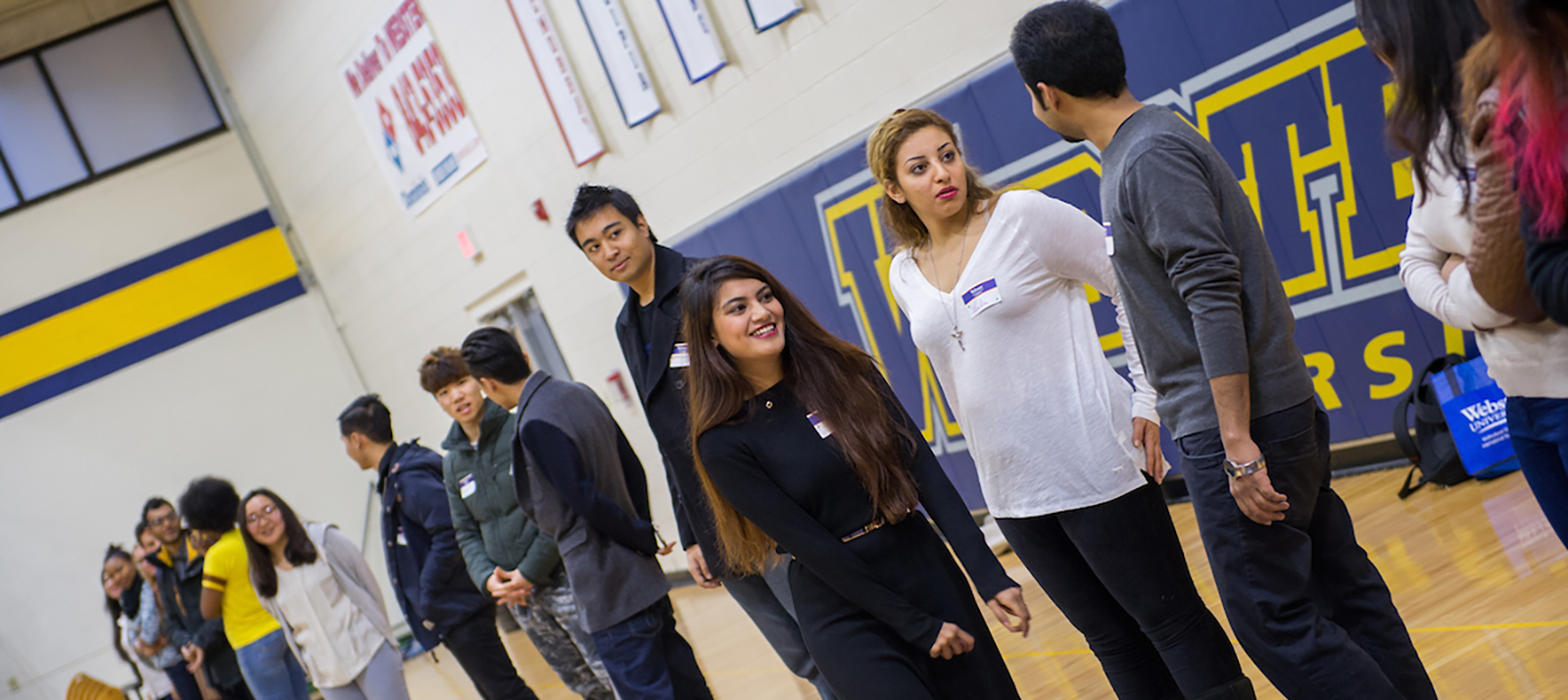
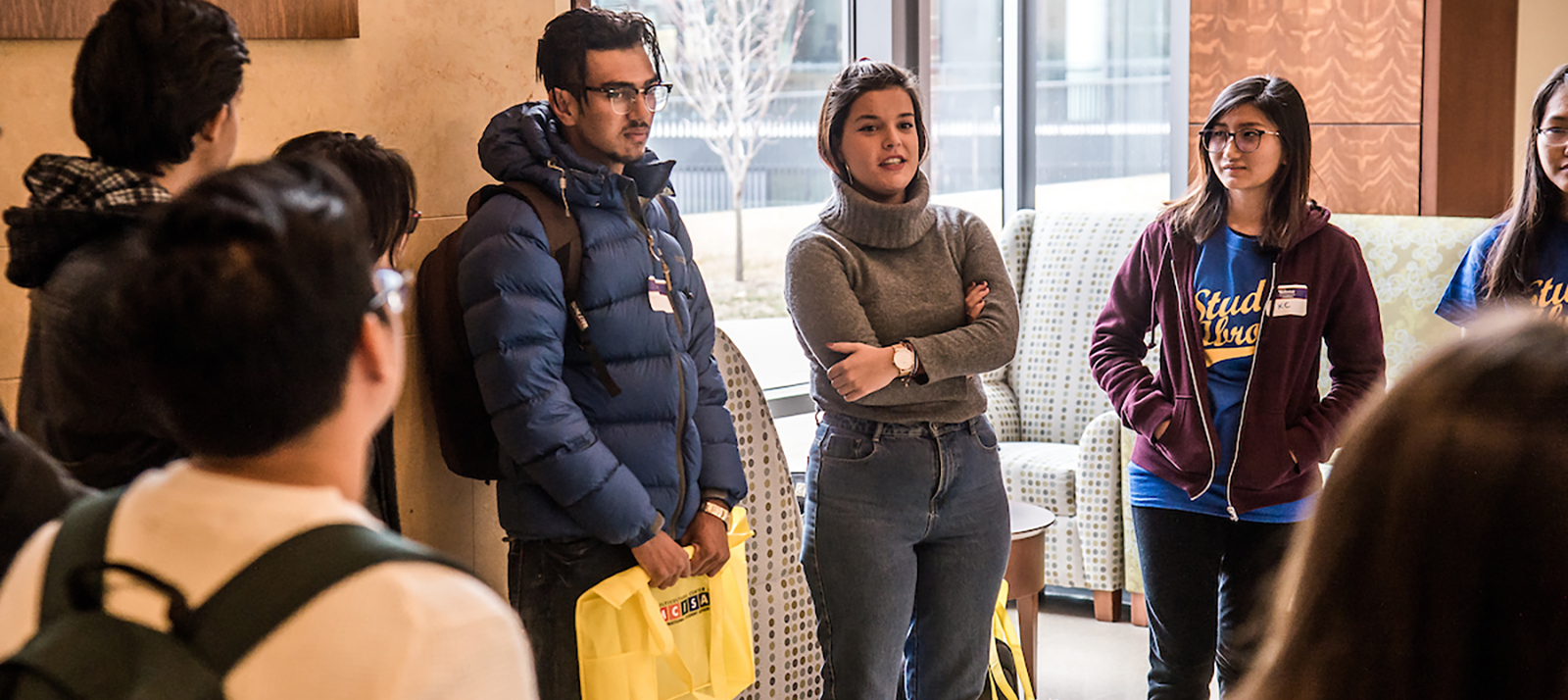
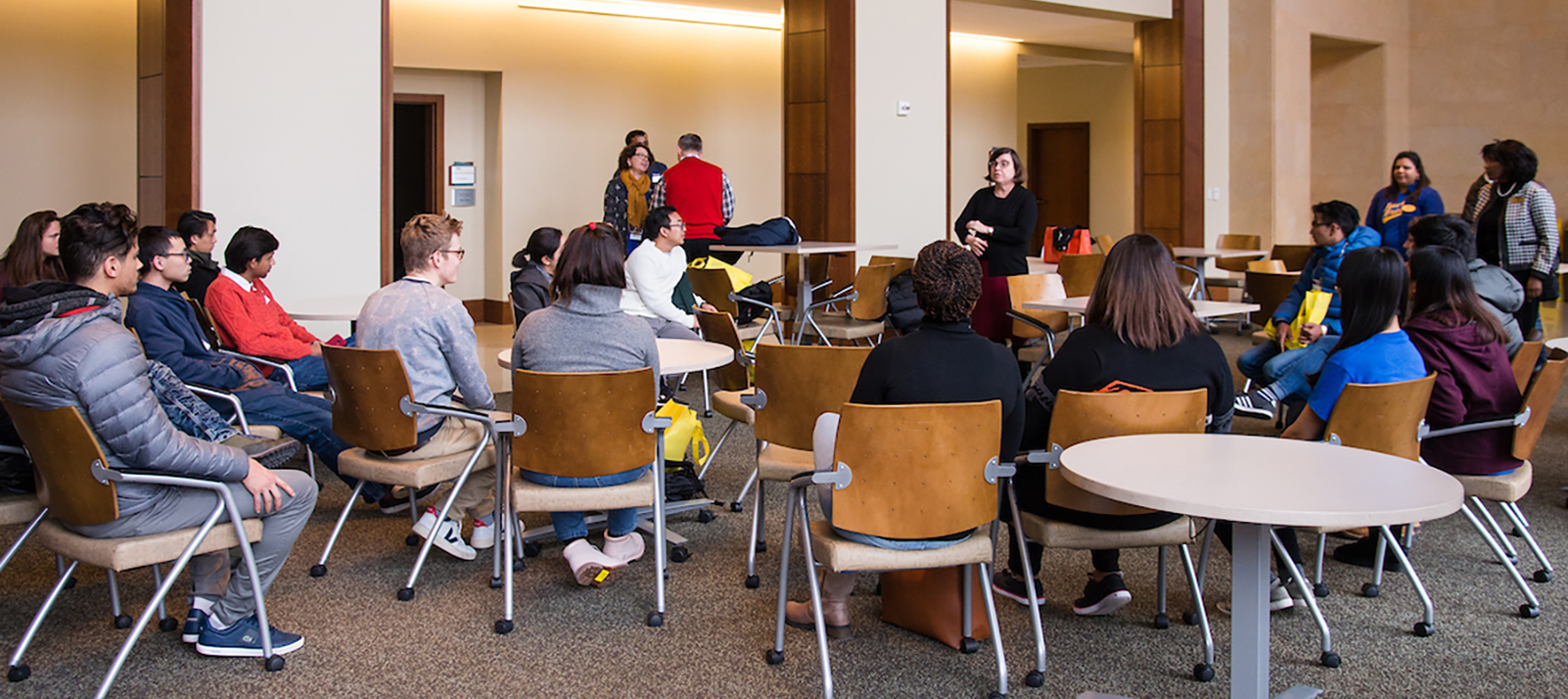
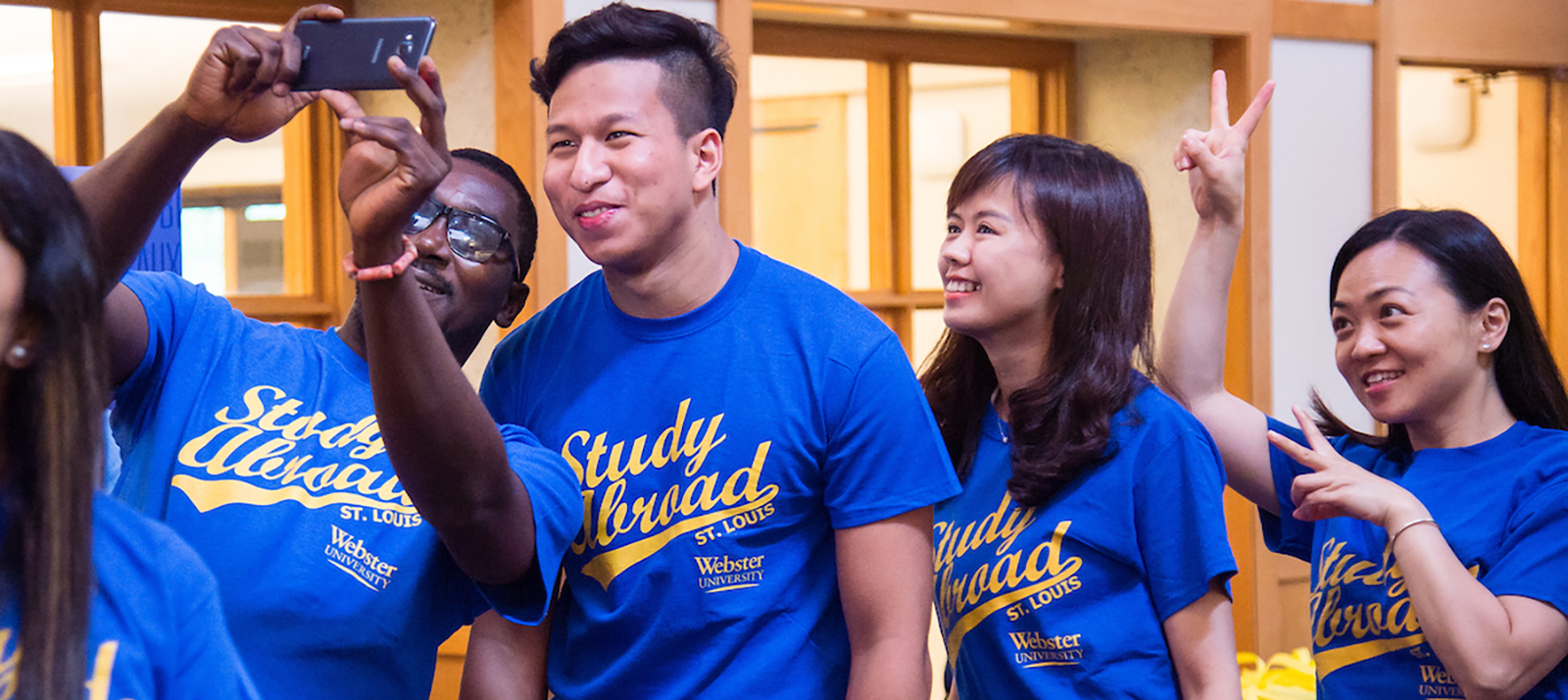
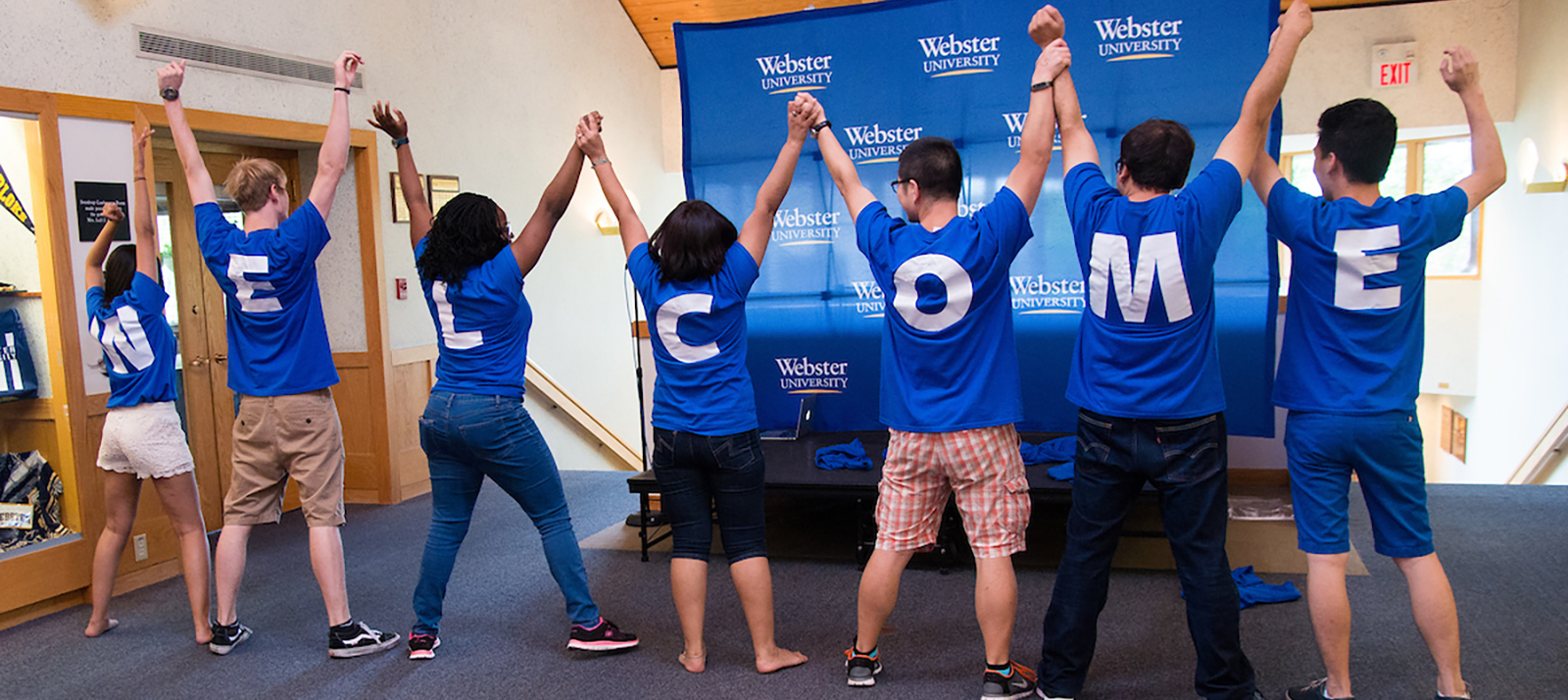
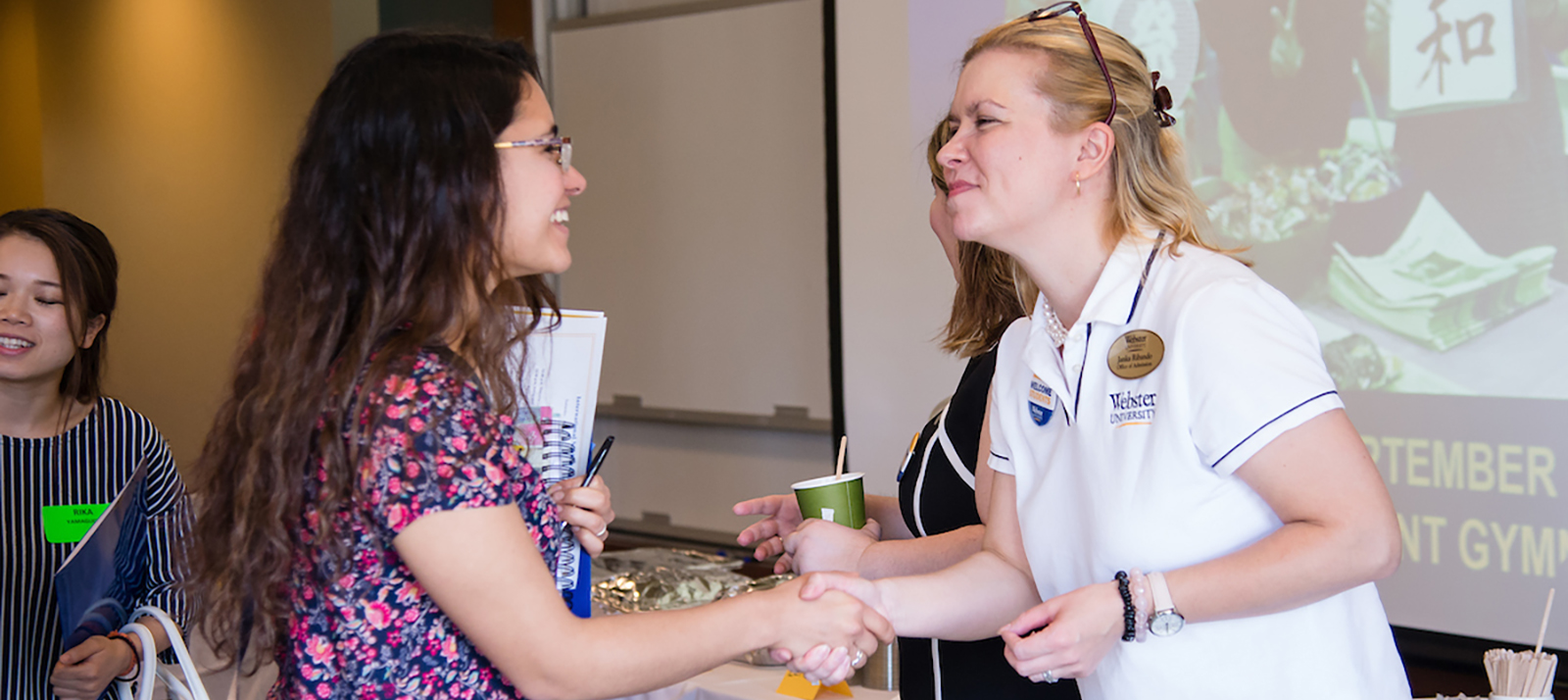
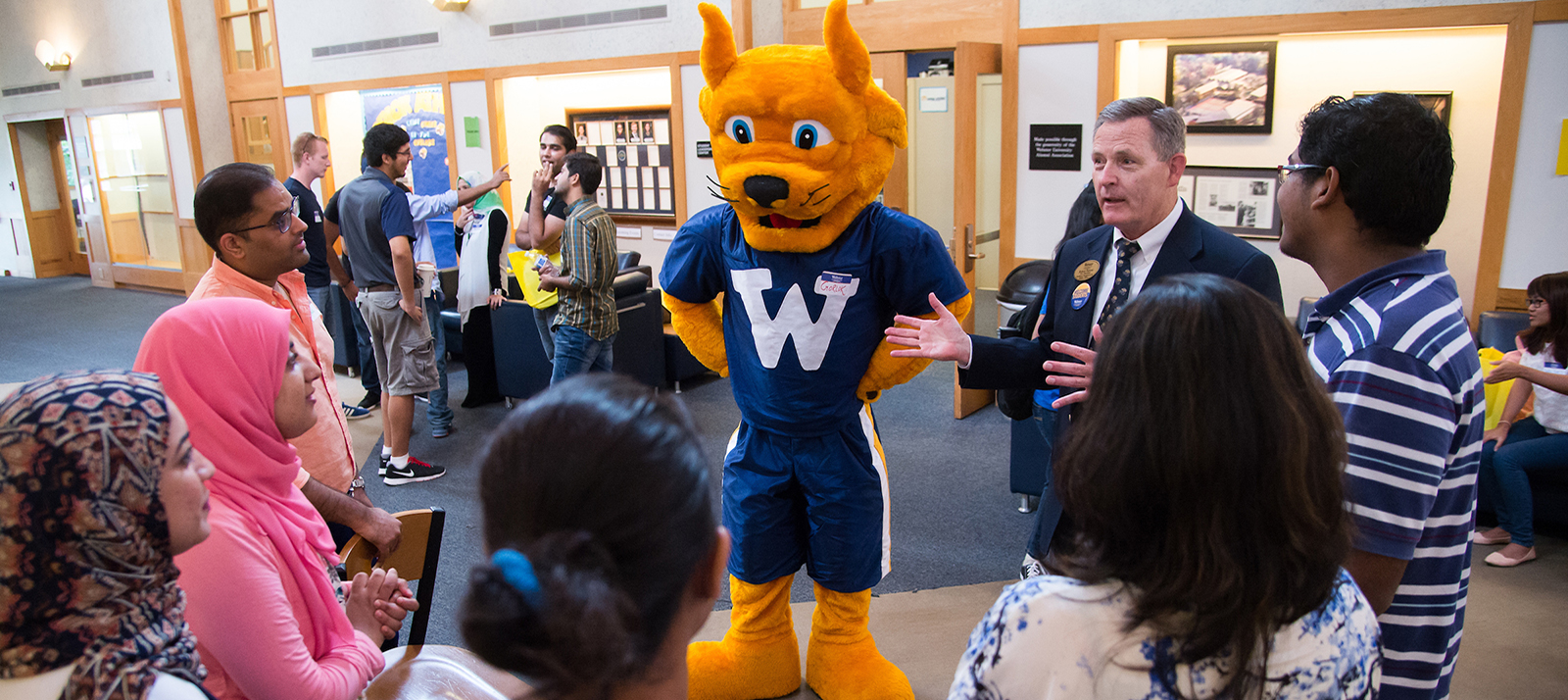
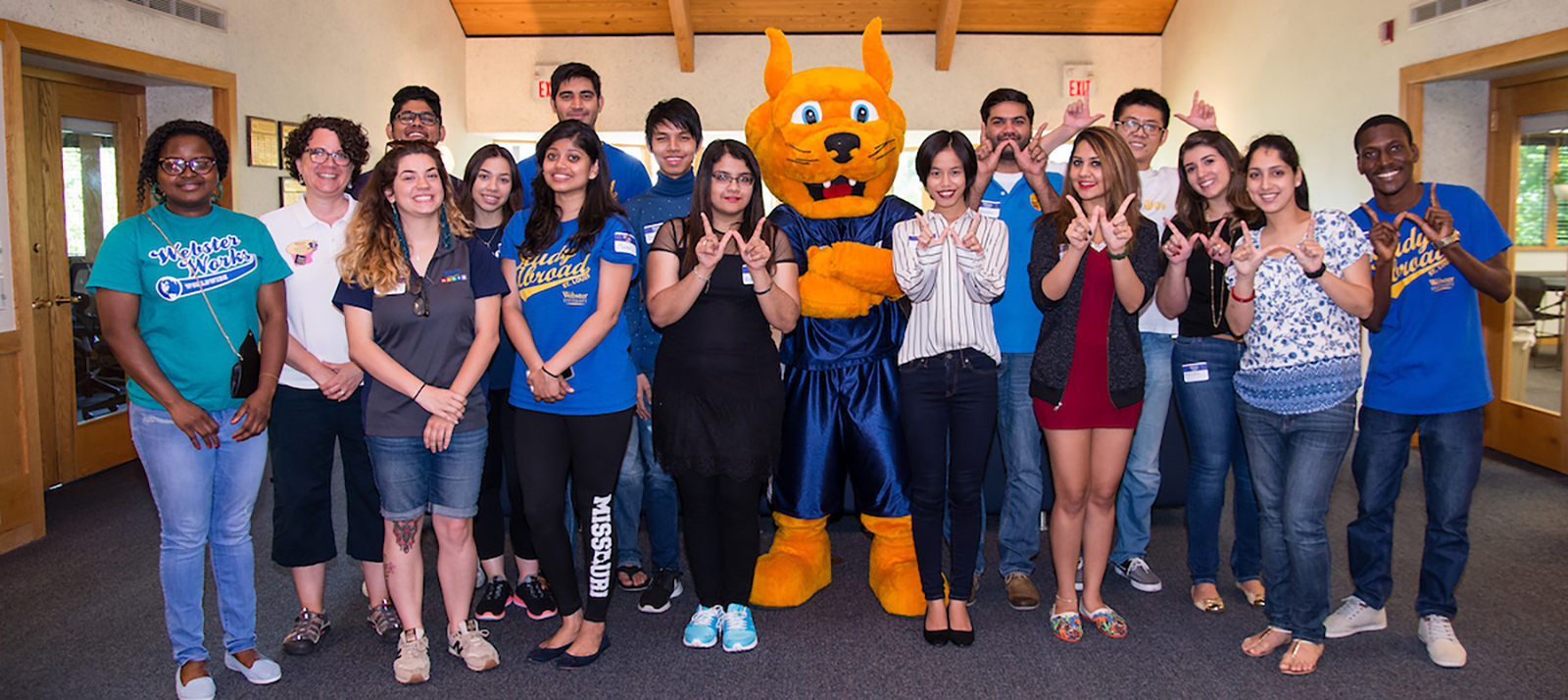
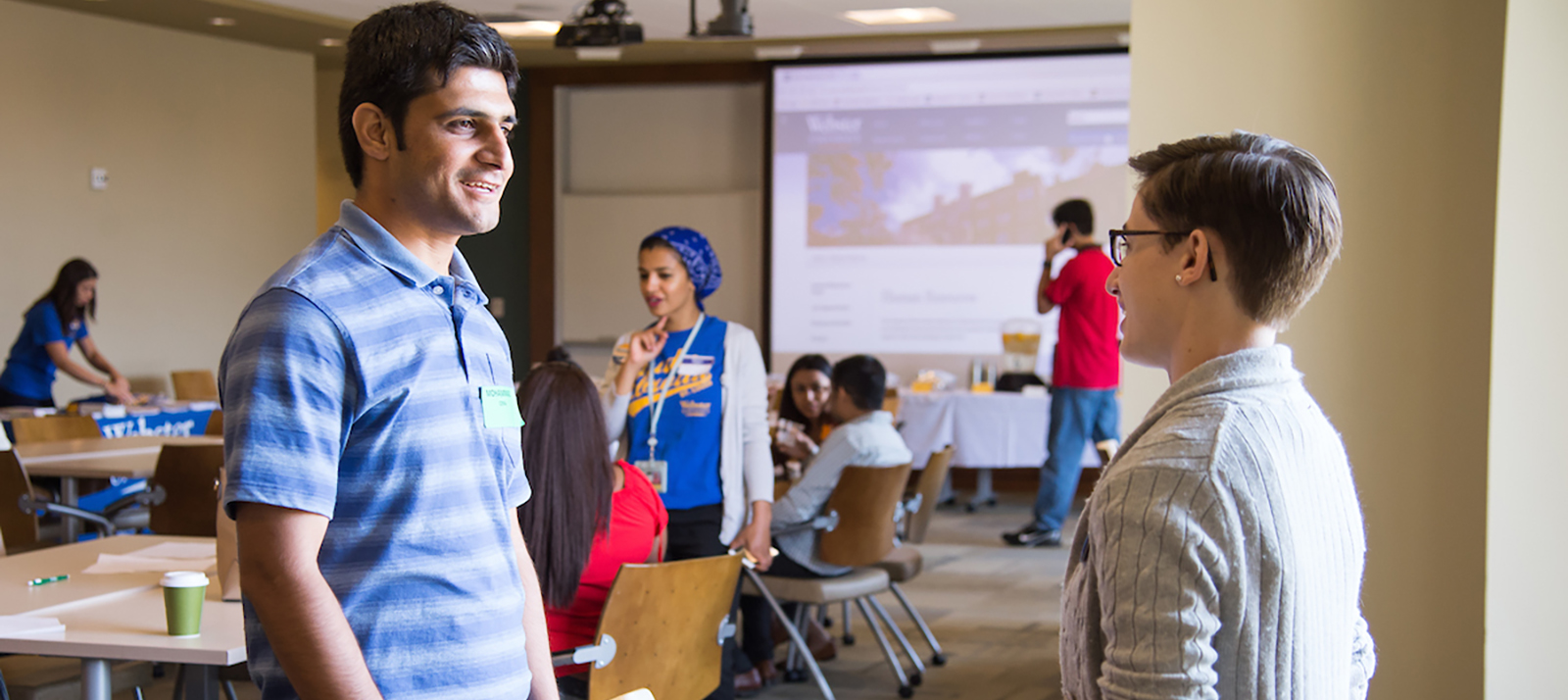
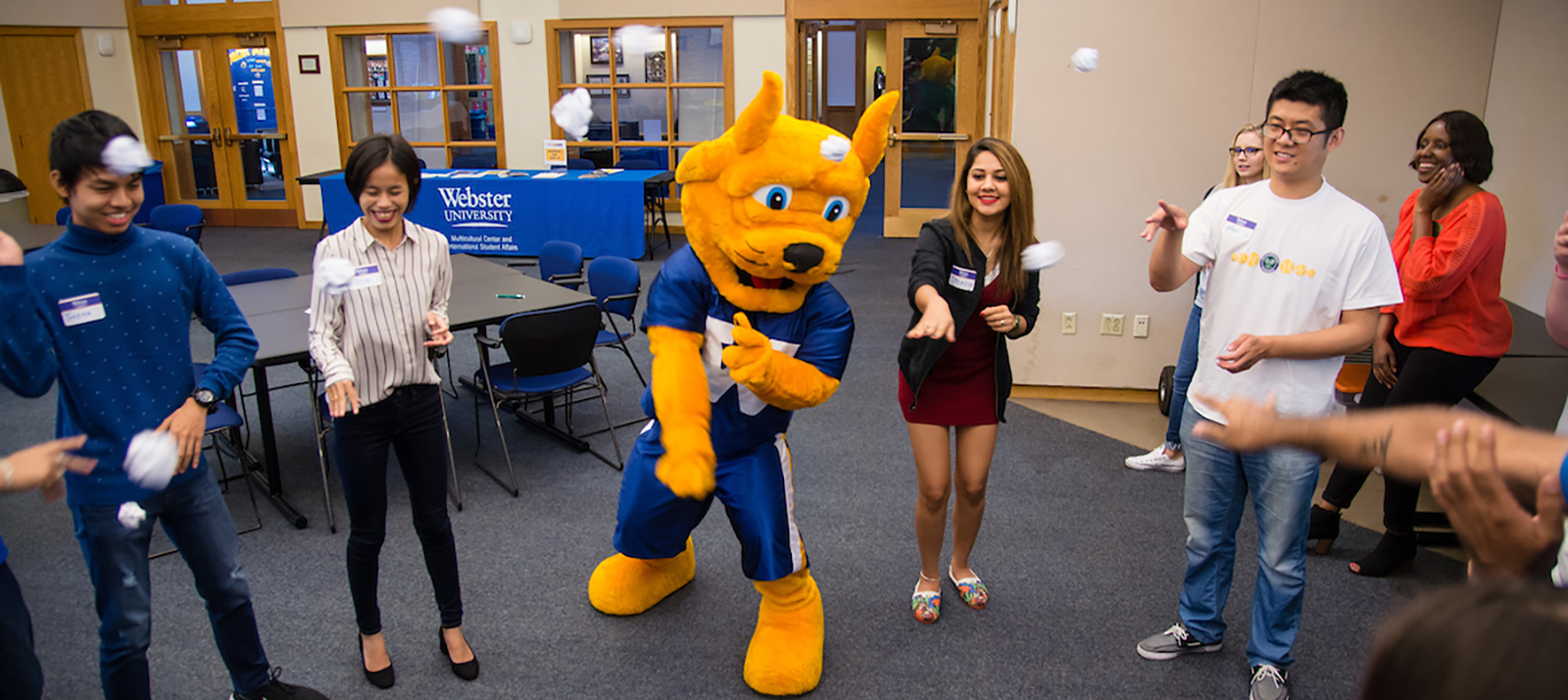
Information to Start Your Job Search
In order to stay in status, you need to be very familiar with the guidelines for living, studying and working in the U.S.
Recommended Actions
- Develop a clear understanding of when you can work on campus and when you are eligible to work off campus.
- Become familiar with the regulations for practical training (Curricular Practical Training, Optional Practical Training, and Academic Training) during your academic study.
- The type of work you can do, when you can apply, length of time in the workplace and other details are specific to you and your visa. Get to know Webster’s Designated School Official and Responsible Officer in the International Recruitment and International Services (IRIS) office.
|
|
Developing connections and engagement to the community where you're studying is an important first step in your career success. Start this process during your first semester at Webster University.
Recommended Actions
- Webster University has over 60 student clubs and organizations representing a range of interests. Participate in groups related to your area of study or intended industry. Visit involved@webster to view a listing of student clubs and organizations.
- Webster's Multicultural Center and International Student Affairs (MCISA) offers services specifically for international students. Relax in the lounge, ask for advice, access resources, or get involved in the many events offered through the MCISA.
- Attend speaker series and other events featuring industry speakers hosted by Webster's many departments. Find out about these events through Webster's events calendar. Also, be sure to check your Webster email account as departments and faculty members will use this address to inform you about events.
- Volunteer to build skills, help others, and meet contacts. Opportunities can be found through VolunteerMatch, United We Serve , or many other local organizations.
- Attend cultural events in the area. In most U.S. cities, individuals from various countries, religions and other cultures will form groups, gather, and host events. In St. Louis, you can find a list of many communities on the Mosaic Project website.
- Utilize Webster's Handshake career management system to identify campus departments that are currently hiring. Search for positions designated as "On-Campus" in the Job Search section of Handshake.
- Participate in professional associations related to your industry of interest. These organizations host networking events, feature trainings and seminars, and provide opportunities to integrate into your profession. Speak to your professors and industry experts to identify relevant associations.
- Attend the Career Planning and Development Center's Career and Internship Fair and employer information sessions. Identify events through Handshake.
| Introducing Yourself |
|---|
| Prepare to initiate conversations with new people by practicing your personal introduction. Include your name, major, graduation date and a summary of your skills and qualifications in a brief introduction (or "commercial"). Another way to think about this is to introduce yourself by explaining your professional and academic present, past and future goals. |
Before applying for internships or jobs, you should prepare all of the materials and skills necessary for an effective job search. Begin practicing and refining your skills during the early stages of your time at Webster.
Recommended Actions
- Develop polished application materials that showcase your key skills and experiences. Learn how to analyze a job description and customize your resume, cover letter, LinkedIn, portfolio, writing samples and list of references to highlight your strengths relevant to that role.
- Identify the geographic locations, industries and specific organizations that appeal to you. Create a list of ideal organizations to target in your job search, but remain open to opportunities outside of these companies.
- Practice your interviewing skills. One way to practice is through scheduling a mock interview with the Career Planning and Development Center.
| Interviewing in the United States |
|---|
|
Now that you've prepared all of the necessary materials, you've developed your communication and interviewing skills, and you have clear goals for the type of jobs, industries and companies you want to target, it's time to apply. Taking an intentional and confident approach will serve you well in this phase of your career development.
Recommended Actions
- Develop an organizational system to track your applications. Some individuals choose to track their contacts, outreach, and progress with submitted applications by using a dedicated notebook, email folder or spreadsheet. Download a sample tracking spreadsheet.
- Begin the process of submitting applications using the well-written and customized application materials you previously created.
- Follow up with prospective employers after submitting an application by calling or sending an email. You will need to be proactive in your job or internship search.
| Following Up |
|---|
| If an organization is waiting for a particular day to evaluate candidates, they will often list an application deadline or date of review. If this is the case, follow up with the organization after that date. If you are not given a specific timeline, follow up one to two weeks after you've submitted your application. Ask about the organization's hiring timeline and what you should expect as you move forward in the application process. Additionally, you could ask questions about the organization or the job, but don't ask questions you could easily answer by looking at the organization's website, news articles or social media. |
International students can utilize all of Webster's resources, but here are a few offices that you should know about:
International Student Career Content
Download printable PDF of the Career Action Menu for International Students
The Career Planning and Development Center (CPDC) is available to assist international students with exploring and defining their personal career goals while developing the skills and confidence necessary to succeed. CPDC advisors assist with identifying sources of experience while studying in the United States, preparing a U.S. style resume, internship and job search strategies, and practice interviewing.
Career Action Combinations
Your career development is personal. The actions you should take each semester are determined by your background and goals. Identify which combination of steps is appropriate for you. The options below are combinations of career-related actions that enhance knowledge, skills, and confidence. Use these as a starting point. You may choose to customize your actions and/or take additional steps aligned with your career and academic goals. Meet with a career advisor for support and guidance.
Career Combination 1: New to Webster
Appropriate for students who are new to Webster University.
- Get involved in an on-campus club related to your interests or area of study; attend the Student Involvement Fair and workshop on Gaining Experience in the U.S.
- Create or update your U.S. Style Resume
- Learn about legal options for employment in the U.S. by visit the International Recruitment and International Services website and/or attending a Curricular Practical Training (CPT) workshop (for F-1 visa holders)
- Meet with a career advisor to discuss how your area of study connects to careers
Career Combination 2: The Career Explorer
Appropriate for students who are exploring and defining career goal(s) and planning to begin an internship or job search within the next six months.
- Get involved in an on-campus club related to your interests or area of study
- Meet with a career advisor to discuss your personal career goal(s)
- Update your U.S. Style Resume to include all current experiences
- Create a list of employers of interest and learn how to identify open internships/jobs
- Learn about your legal options for employment in the U.S. by attending a Curricular Practical Training (CPT) and/or Optional Practical Training (OPT) workshop (for F-1 visa holders)
Career Combination 3: Seeking Experience
Appropriate for students with a current resume, defined career goal(s), and actively applying to openings.
- Meet with a career advisor to discuss your internship or job search plan
- Learn about your legal options for employment in the U.S. by attending a Curricular Practical Training (CPT) and/or Optional Practical Training (OPT) workshop (for F-1 visa holders)
- Submit internship/job applications using customized application materials
- Develop interviewing skills through a workshop or in-person advising appointment
Download printable PDF of the Internship and CPT Checklist for F-1 Visa Students
If you have determined you would like to search for an internship and utilize Curricular Practical Training (CPT) for temporary work authorization to gain experience in the U.S., follow the steps outlined below. Learn more about eligibility and processes for CPT on the International Recruitment and International Services website.
Am I Eligible for an Internship Through CPT?
- Email International Recruitment and Services at intlservices@webster.edu to ask if and when you are eligible for CPT. Make note of the response provided.
- In general, students must have been enrolled full-time (12 credits per semester for undergraduates, 6 credits per nine-week term for graduates) for at least one full academic year or nine months to be eligible.
- More details on eligibility can be found on the International Recruitment and International Services website.
Are you eligible for an internship through CPT? Yes No
If yes, what is the eligibility date provided? ________________
Earning academic credit for an internship is a required part of CPT. Review information on earning academic credit for internships by speaking with a faculty internship coordinator in your school/college, who can help you determine eligibility and processes for obtaining academic credit for internships. Click the school/college of your academic major below to learn about eligibility and processes.
- Walker School of Business & Technology
- School of Communications
- College of Science and Health
- College of Humanities and Social Sciences
How Do I Find an Internship?
- You do not need to wait until you are eligible for CPT to search for an internship, but you should know the date you will become CPT-eligible. Learn about internship searching using resources available through the Career Planning and Development Center (CPDC). Schedule an appointment with a CPDC career advisor to discuss internship search strategies and resources. Appointments can be scheduled by phone, in-person or through Handshake.
- Apply to and interview for internships related to your degree program. Upon acceptance of an internship offer, request from the employer a detailed offer letter.
Make It Official
- Follow the directions of the faculty internship coordinator in your school or college for completing an application to earn academic credit for your internship and enroll in your internship course. The Application for Academic Credit must be signed and returned to the appropriate departmental Faculty Internship Coordinator (St. Louis region).
- Complete the CPT Request Form and submit to intlservices@webster.edu. International Recruitment and International Services will issue a new I-20 within 5-7 business days of submission.
Note: You may begin working only after receiving and signing a new CPT I-20.
The Importance of Formatting
Employers form first impressions of your resume within a matter of seconds. Having a consistent and clear format is critical to engaging employers. Employers should be able to quickly skim your resume, note critical qualifications, and be interested in reading your resume more in depth. If your resume is hard to read or contains errors, employers will likely struggle to find relevant information and simply move on to the next resume in the application pool.
Resume Standards
There are some consistent resume standards that most resumes should follow. Other aspects of resume writing are down to the preferences of individuals. Different industries may have subtle differences in resume style so it is always advisable to gather information about your preferred industry. At the end of the day, it is your resume and should reflect your skills and experiences.
Resumes do differ by country and the information discussed in this guide pertains to US style resumes. For instance, you would never include a photo on a US style resume unless you were auditioning for say an acting role and they require a headshot. It is common in some other countries to include a photo though.
Consider how your resume will appear both digitally and in print. A resume design that looks great on a computer screen might be hard to read when printed on a black and white printer.
Resume Design Elements
Consistency is key. Inconsistencies in your formatting may distract employers from your content or give the appearance that you did not take the time to proof-read your document. Consider all elements on your resume whether the size of your font, bullet point shape, spacing, use of abbreviations, etc.
Use different forms of typographical emphasis such as bolding, italicizing, underlining and all caps to help important information stand out. When you overuse a form of emphasis it no longer helps readers to identify key content. If you like the look of lines under your headers, use the Borders function on Microsoft Word for easy editing.
Consider the images below and how easy it is to quickly identify the most relevant information.

Little distinction between types of information

Bolding used as the main source of emphasis

Using multiple forms of emphasis to distinguish between different types of information
Relevance
Your most important and relevant sections should be listed first. For instance, a new graduate would include their education section first as that is their strongest qualification while someone mid-career would include their work experience before their education.
Focus on your skills and experiences that are most relevant for the position you are applying to as you tailor your resume.
Within each section, your experiences should be listed from most recent to oldest. Employers are most interested in knowing what you have been doing professionally in the recent history.
Page Length
Resumes are typically one page. Two page resumes are acceptable especially if you have more relevant experience or advanced degrees. You should not exceed two pages for your resume. Employers are likely to not read past that point. Resumes are not an autobiography and should be tailored to showcase your most relevant experience, skills, and qualifications for a specific position.
If the application calls for a CV or a federal resume, more information needs to be included so there is greater flexibility with page length for those.
If you have more than one page, add your same header as the first page or insert your name and page number on the subsequent page header or footer. This prevents any confusion when your resume is printed.
Margins
The standard size for margins is 1 inch on all sizes. This creates visual balance for your document. Margins can be adjusted slightly if needed. When margins are less than .5 inch it is likely that information will be cut off while printing. Too small margins can also make a document appear overwhelming to read and may be less engaging to employers. Find instructions for changing margins in Microsoft Word.
Compare the look and readability of the two sample resumes below.
https://express.adobe.com/page/ykFoFIq9ybYeE/
Download printable PDF of the Writing a U.S.-Style Resume Activity Sheet
Writing a resume is a new skill for many students. Use this activity sheet to brainstorm and organize content to include on your resume.
Contact Information/Header
Name, phone number (including area code), e-mail address
Education Information
Name of the college or university and its location (city and state), Degree and major, expected graduation month and year
For multiple degrees, list in reverse chronological order, with your most recent degree first.
Experience
Identify experiences that highlight your skills and qualifications for your intended reader.
Sources of experience include:
- Study abroad experience
- Volunteer positions
- Co-curricular activities
- Major class projects
- Academic service
- Student clubs and organizations
- On-Campus student employment (Webster Groves, Missouri)
- Internships (CPT)
List each experience with the following identifying information:
- Name of the Employer/Volunteer Site/Campus Club, etc.
- City and State (St. Louis, MO; Orlando, FL; Irvine, CA)
- Duration of the experience (Month Year - Present/Month Year)
- 3-5 bulleted task descriptions to tell your reader more about the skills and responsibilities you had in each position
Printable PDF of the International Talent Employers List
The information below is organized by industry, employer name, and position titles. Note, this list is a starting point to explore employers who have previously hired international talent. Students are encouraged to speak with a Career Advisor in the Career Planning and Development Center to develop a list of employers tailored to their academic and career interests.
Students interested in Curricular Practical Training and/or Optional Practical Training should speak first with a representative from International Recruitment and International Services before starting a job or internship search process.
International Talent Employers in the St. Louis Metro
Listed employers have been identified through GoinGlobal’s H-1B Plus database. All students can access GoinGlobal through Handshake
Accenture LLP, Management and Technology Consulting
Position Titles: Computer Systems Analyst, Computer Occupations
Aggio LLC, Agribusiness/Information Technology
Position Title: Business Management Analyst
Agilis Systems, LLC, Asset Tracking and Workforce Management
Position Title: Software Developer
Ameren Corporation Utility Holding Co.
Position Titles: Civil, Mechanical, Industrial, and Electrical Engineer, Economist,
Software Engineer
TheBANK of Edwardsville, Banking/Finance
Position Title: No information available
Bunge North America, Agribusiness
Position Titles: Operations Research Analyst, Economist, Accountant
Caleres, Footwear Retailer
Position Titles: Logistician, Software Developer, Computer Systems Analyst
CEdge Software Consultants, Information Technology
Position Title: No information available
Cognizant Technology Solutions, Business Technology Services
Position Titles: Network and System Administrator, Computer Systems Analyst
Commerce Bank/Commerce Bancshares, Banking/Finance
Position Titles: Financial Analyst, Statistician
Cotton Babies Inc./Child Care Product Manufacturing
Position Title: General and Operations Manager
Curium, Pharmaceuticals
Position Title: No information available
Donald Danforth Plant Science Center, Plant Science, Research and Design
Position Titles: Soil and Plant Scientists, Biochemist, Biophysicist, Microbiologist
Dot Foods, Inc. Food Distribution
Position Title: Computer Programmer
Edward Jones, Finance
Position Titles: Client Analytics Manager, Programmer Analyst, Market Research Analyst
Enterprise Holdings
Position Titles: Software Developer, Computer and Information Systems Manager, Marketing
Manager
Express Scripts, Pharmacy/Health Care Services
Position Titles: Software Developer, Software Engineer, Logistician, Information Systems
Manager
KWS Gateway Research Center, Research and Product Development
Position Title: Program and Operations Manager
Mastercard Global Technology Operations, Financial Services
Position Titles: Operations Research Analyst, Software Developer, Information Security
Analyst
Midwest Bank Centre, Banking/Finance
Position Title: No information available
Monsanto, Agribusiness
Position Titles: Accountant, Auditor, Computer and Information Research Scientists,
Computer Programmer
NextGen Information Services, Inc. Information Technology Staff and Recruiting
Position Titles: Software Developer, Database Administrator
Northwestern Mutual Financial Network
Position Title: No information available
Reinsurance Group of America (RGA), Insurance
Position Titles: Actuary, Financial Analyst, Statistician, Management Analyst
Scottrade (Now TD Ameritrade), Financial Services
Position Titles: Software Developer, Database Administrator
Spectrum (Charter) Communications, Media
Position Titles: Network Engineer, Software Specialist
Square, Credit Card Services
Position Title: No information available
Tech Mahindra (Americas) Inc., IT Services and Consulting
Position Titles: Computter Programmer, Software Specialist
Thompson Reuters, Investment Services
Position Titles: Software Developer, Network and System Administrators, Computer Systems
Analyst
Trivers Associates, Architecture
Position Title: Architect
Tao + Lee Associates, Inc. Architecture
Position Title: No information available
Vega Transport, Transportation and Trucking
Position Title: No information available
AAA Translation, Translation Services
Position Title: No information available
Gateway Science Academy of St. Louis, Education
Position Titles: Elementary and High School Teachers, Administrator
International Institute, Non for Profit Service Organization
Position Title: No information available
Mary Institute and St. Louis County Day School, Education
Position Titles: Elementary and High School Teachers
The Principa, Education
Position Titles: Elementary, Secondary and Post-Secondary Teachers/Faculty, Administrators
St. Louis Language Immersion Schools, Education
Position Titles: Elementary and High School Teachers, Librarian
St. Margaret of Scotland School, Education
Position Title: No information available
Villa di Maria Montessori, Education
Position Title: No information available
Washington University in St. Louis, Education
Position Titles: Assistant Professor, Research Assistant, Statistician
River City Casino, Leisure Services
Position Titles: No information available
St. Louis MOSAIC Project Ambassador Companies show outstanding dedication and commitment to international communities.
- AAA Translation
- Aggio LLC
- Agilis Systems LLC
- TheBANK of Edwardsville
- CEdge Software Consultants
- Commerce Bank/Commerce Bancshares
- Cotton Babies Inc.
- Curium
- Dot Foods Inc.
- International Institute
- KWS Gateway Research Center
- Mary Institute and St. Louis County Day School
- Midwest Bank Centre
- Monsanto
- NextGen Information Services Inc.
- Northwestern Mutual Financial Network
- Reinsurance Group of America
- River City Casino
- Square
- St. Louis Language Immersion Schools
- St. Margaret of Scotland School
- Tao + Lee Associates Inc.
- Thomson Reuters
- Trivers Associates
- Vega Transport
visit stlmosaicproject.org for additional information and resources.
Contact Us
568 Garden Ave., St. Louis, MO 63119
Email: careercn@webster.edu
Phone: 314-968-6982 (Toll Free: 800-981-9805)
Office Hours: 8:30 a.m.–5:30 p.m., Monday-Thursday; 8:30 a.m.–4:30 p.m. on Friday
